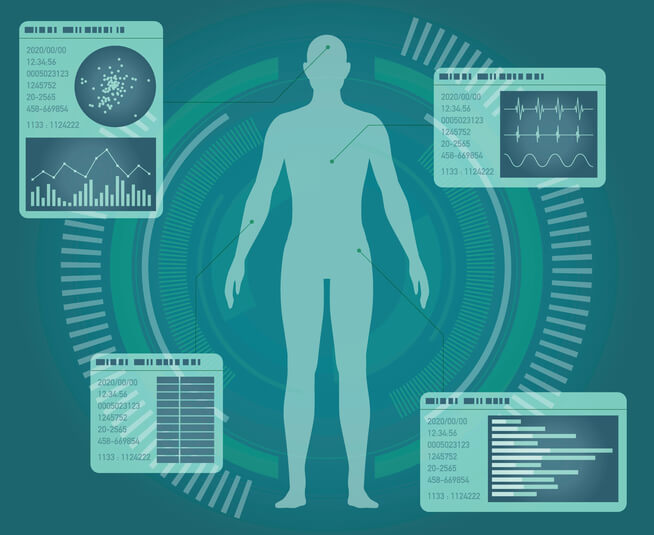New insights from digital biomarkers
Nowadays, Big Data is the new buzzword in the market. However, its real value is reflected only when substantial evidence supports it. Digital biomarkers pave the way to translate new data sources into informative, verifiable, and actionable insights.
Healthcare is undergoing a digital revolution, and it is imperative for the sector to introduce and leverage new technologies to generate, collect, and track data. However, the adoption of digital markers is not easy. It too faces the same challenges as traditional markers. Also, the variety and its relevance in fields like neurology and psychiatry, problems regarding evidence generation and infrastructure still plague its introduction. But before we begin, let’s give a short overview of digital biomarkers.
What are digital markers?
Biomarkers are indicators of standard biological, pathogenic, pharmacologic processes which are objectively measured and evaluated. And what about next generation of biomarkers which have gone digital? These are consumer-generated behavioural and physiological measures gathered through connected digital tools that can be used to explain, influence and predict results/outcome.
They are classified according to their insight and novelty of measurement. Measurements can be known or novel. A known idea is one that has previously been validated and is well understood. For example,
- Novel Insight and novel measurement: Measure blood pressure continuously to diagnose clinical depression.
- Novel Insight and known measurement: Track blood pressure continues to predict a heart attack.
- Known Insight and novel measurement: Measure blood pressure discretely to diagnose clinical depression.
- Known Insight and known measurement: Track blood pressure discretely to predict heart attack
| Recommended for you | |
| Blockchain technology for diabetes prevention technology | |
| Big data in medicine | |
| Hottest technologies in the digital health sector |
What are their applications?
Currently, longitudinal data (for example, Framingham Heart Study, the Nurses’ Health Study, and the Women’s Health Initiative ) is used to understand better, detect, and manage diseases. Although accurate, it ‘s hard to fund and implement. Also, the entire demographic heterogeneity is not captured well. Digital biomarkers, on the other hand, offer the following advantages:-
- It is an inexpensive way to collect population-level health data over time and introduce longitudinal data for individual consumers through passive and continuous monitoring.
- It increases precision in population health management.
- It supplements existing biomarkers in sectors that rely on subjective and observational assessments to diagnose or monitor disease;
- Passive measurement of digital and online behaviour can help in the development of more objective measures of brain disorders;
- It also offers people to track their health essentials outside walls of hospitals.
Current status
There is a general growth in digital tools observed nowadays. This allows physicians to continuously monitor individuals health, which leads to development in healthcare. The rise of smartphones has led to increased access to healthcare apps. About 30% of US smartphone owners use at least one health app that allows individuals to track various health measures (e.g., blood pressure, heart rate, physical activity, sleep). Digital healthcare technologies like AliveCor makes it possible to take an electrocardiogram (ECG) at home or on-the-go. Consumers on sites like Twitter, Facebook or Tumblr also share health-related data which can be utilized by the healthcare sector.
Companies which are working on it are Cardillo, DigiSight, Happify, HappyDX, myfitnesspal, Insight, QM, Qaunttus, SARVINT, Fitbit, etc.
How to make data meaningful?
By integrating various biomarkers under one umbrella, proper diagnosis, prognosis, and predictions can be done. Digital phenotype signatures can be combined with other data. For example, a recent study using EMR data mining investigates clinical subtypes of Type II diabetes and integrated genetic association analysis to identify genetic markers of each subtype. This promises to enhance diagnostic, prognostic, and predictive capabilities directly.
Before the big data is combined with a sophisticated algorithm to yield results/outcome, validation through testable hypotheses and replicable results is necessary. The integration of digital biomarkers in clinical practice will be possible upon rigorous validation and approval.
Biopharma will need to leverage digital biomarkers to show high real-world value and profit as the leaning towards pay-for-performance increases. They can be used as a collection of real-world information, analyzed in association with clinical and experimental data, and returned to the professional healthcare in real-time, enabling precise, patient-specific medical decision-making. They can also be used to further stratify patients and create individual care plans.
Challenges faced
Many problems exist around identifying and processing relevant data before data becomes an insightful digital biomarker.
- In healthcare, big data is useful when there is a strong body of clinical evidence.
- Another problem is data hygiene and standardization. Unless data set is properly cleaned and maintained in standardized forms, integration between different digital biomarkers and existing healthcare infrastructure (e.g. EMR) will be significantly inhibited.
- Furthermore, the digital biomarker should be evaluated against the current gold standard to assess the non- inferiority, equivalence or superiority of the digital biomarker.
Image credit: www.istockphoto.com

















